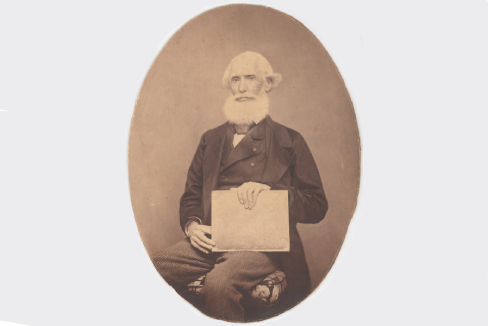About the George Finlay Papers

The George Finlay Papers contain materials created by and related to the British Historian and Philhellene George Finlay, his father John Finlay, Greek-American Philhellene George Jarvis, and British Philhellene Captain Frank Abney Hastings, dating from 1791 to 1949. Most of the collection consists of George Finlay’s meticulous records of his travels, personal and official correspondence, his personal expenditures, copious memoranda on strategy and on military and political organisation, journal entries, maps, facetiae, scrapbooks, personal notes on people—Greeks and others—and on revolutionary events, newspaper cuttings mainly on Greece and international affairs, as well as Finlay’s original manuscripts of the History of the Greek Revolution (1861) as well as corrected proofs of Finlay’s other published works.
Also included are the papers of Finlay’s father, John, two journals of Greek American philhellene, George Jarvis, and those of Finlay’s fellow British philhellene, Captain Frank Abney Hastings. The Hastings papers, which Finlay purchased in 1830, include personal and official correspondence, ship’s logs, notes that he took on board or ashore, as well as memoranda on strategy and on the naval organisation of the revolutionary forces. Collectively, these records reveal a great deal about the character, motivations, ideas, as well as the military and political judgements of these British individuals, as well as of many others, both British and Greek, with whom they interacted during the Greek War of Independence as well as many of Finlay's other interests, such as Classical and Byzantine history, natural history and politics.
To George Finlay. n.d. Copy of Greek constitution sent to George Finlay (in Greek).
Greek translation of Earl of Aberdeen's dispatch to Sir Edmund Lyons dated 25 November 1843, printed with two omissions in Parliamentary Papers; correspondence relating to recent events in Greece 1843-4, p. 14, no. 8. (Also extract in English.)
Extract from Lord Aberdeen's instructions to Sir Edmund Lyons, 25 November 1843.
Extract from Lord Aberdeen's private letter to Sir Edmund Lyons dated 6 December 1843.
Note on misleading nature of Sir Edmund Lyons's eulogy of Armansperg's administration in Additional Papers relating to the third instalment of the Greek loan presented to Parliament, August 1836, p. 37.
Miscellaneous newspaper cuttings including biography of Sir Edmund Lyons.
Letters 1-236 (all loose), arranged chronologically, followed by undated letters. In the Hussey catalogue, the letters were arranged into folders A-G, which covered the following dates: A: 1824-39, B: 1840-49, C: 1850-55, D: 1856-59, E: 1860-65, F: 1866-74, G: undated. In the current catalogue they are simply presented chronologically, with undated letters at the end, but the physical letters are still in folders A-G. The letters sometimes have old paper enclosures that may be annotated in Finlay's hand.
George Finlay's own letters are copies, the rest originals unless otherwise stated.
William Henry Humphreys to Col. Stanhope, Athens. Salona, 12 March 1824. Blackit has just brought a letter from Mesolonghi from George Finlay mentioning Byron's inclination to come to Athens.
Edward Blackett to George Finlay. Athens, 2 April 1824. Acknowledges receipt of money and asks about George Finlay's plans during approaching campaign.
Leicester Stanhope, Stable Yard, St.James, to George Finlay, (?) June 1825 . Praises George Finlay's sketch of Byron.
Leicester Stanhope, Stable Yard, St.James, to George Finlay, 13 July 1825. Praises George Finlay's sketch of Byron.
Sir Patrick Malcolm to George Finlay. 2 December 1831, and 28 March 1832. Two letters expressing distrust of Gropius, Austrian consul at Athens, whom he had employed to build a house there; deplores delays and growing expenses.
Sir Patrick Malcolm to George Finlay. 28 March 1832. re his house and Gropius. [See 2 December 1831.]
Thomas Gordon to George Finlay. Cairness, 26 April 1832. Pessimistic remarks re British government; fears that Greece under Capodistrias will become province of Muscovy; prospects of Prince Otto of Bavaria.
Peter Wilhelm Forchhammer to George Finlay. Nauplia, 31 August 1833. Criticism of dictatorial ways and political ignorance of Mr. Franz. Has journeyed through Peloponnese. Hopes to obtain British Admiralty map of Greek coastal waters. With an old paper enclosure.
Thomas Gordon to George Finlay. Nea Patra, 15 September 1835. re expedition against bandits in Roumeli with Turkish co-operation. Ironical comments on Gen. Church sitting in Patissia leading 'the life of Nebuchadnezzar'. Note of greeting added by C. Soutzo.
E. Hill to George Finlay. Anavrita, 22 December 1835. Apologizes for delay in returning book lent by George Finlay. With an old paper enclosure.
Charles Macintosh, Dunchattan, to George Finlay. 20 May 1836. To introduce David Dundas.
G. Gropius to George Finlay. 17 October 1836. Proposes to visit George Finlay with Prince Pückler.
Psyllas to George Finlay. Athens, 3/15 November 1836. Sends lists of Greek studying abroad.
George Finlay to Museum of Natural History. Athens, 1/13 December 1836 (incomplete). Re fossil bones found near Pikermi and site of ancient Brauron and Persian arrowheads found in Attica. Offer made to Society's museum.
Maurer to George Finlay. 10 January 1837. Critical remarks re Rudhart and Armansperg. Palmerston's anger (in French). [Note added by George Finlay: 'This letter was sent by Mr. Maurer. Mr. Herzog, Professor of Roman Law at Athens brought it and received it from Mr. Weissenberg.']
James Robertson to George Finlay. Argos, 19 January 1837. Favourable comments on George Finlay's pamphlet on government of Greece exposing blunders of 'our successive rulers'. Had not expected such moderation. Comparison with Thiersch's book.
Thomas Gordon to George Finlay. Argos, 20 January 1837. Favourable comments on George Finlay's book. Asks for political news from Athens.
Sir Edmund Lyons to George Finlay. 29 January 1837. Requests George Finlay to read enclosed papers before they are sent to England.
The Revd. John Henry Hill to George Finlay. 25 February 1837. Favourable criticism of George Finlay's 'pamphlet'.
Joanna Baillie to Mrs. MacGregor (George Finlay's mother), Everton, Liverpool. Hampstead, 21 November 1837. Expresses gratitude for George Finlay's work on Greece.
Sir Edmund Lyons to George Finlay. 16 March 1838. Comments on King Otho's decision to keep Bavarian officers and civilians another year in Greece.
Rollin to George Finlay. Paris, 29 May 1838. Information re coins.
Thomas Gordon to George Finlay. Argos, 1 June 1838. Unwillingness to print George Finlay's Oropia together with his Thermopylae. Reflections on Ctesias' account of Cyrus. With letter added by James Robertson re crops on their property and Bank in Athens.
Lord Prudhoe to George Finlay, Athens. Malta, 7 July 1838. Thanks for cast of Gropius's 'little figure' offered by George Finlay. Requests information on excavations at Leuctra by Lord Haddo and other Englishmen.
George Anderson to George Finlay. Free Church House, Helensburgh, 27 September 1839. Letter introducing Mr. Agnew. Appreciation of George Finlay's work.
Charles-Félix-Marie Texier to George Finlay. Paris, 5 April 1843. Arrival of marbles from Magnesia prevents T from meeting George Finlay.
Marochetti to George Finlay. 21 April 1843. Desire to meet George Finlay and Mrs. F. Sends tickets for an exhibition of paintings and sculpture (in French).
Marochetti to George Finlay. Vaux, Seine-et-Oise, 22 April 1843. Pleasure of their visit (in French).
The Earl of Dundonald (Cochrane) to T. Bannister and the latter's reply (extract, copy only). 25 May 1843.
Lord D recounts his misfortunes. He cannot recollect from whom B received his appointment. (Extract.)
B replies that his commission as Major was signed by Lord D thus: 'Cochrane'.
T. Brown to George Finlay. London, 13 September 1843. Difficulty of obtaining dissertations.
A. Miaoulis to George Finlay. Piraeus, 19 July 1844. Sends good wishes to George Finlay in case he does not see him; is unexpectedly sailing this evening for Poros and thence to Toulon. Will execute any commissions for George Finlay if he writes at once to Poros. Regrets leaving Greece at this point and asks George Finlay to send him news (in German, Gothic script).
Edwin Chadwick to C. H. Bracebridge (forwarded to George Finlay with a note by B). 5 August 1844. Suggestions re water supply of Athens. With an old paper enclosure.
Julius Millingen to George Finlay. Pera, 7 September (?) 1844. Thanks George Finlay for his Greece under the Romans. Present state of Greece; Serbians more sensible.
Bernard Bauer to George Finlay. Athens, 20 February 1845. Asks George Finlay to lend him Leake's book on Athens for M. de Bruce (in French).
Jean-Alexandre Buchon to George Finlay. Paris, 16 April 1845. Re B's publication on Frankish principality of the Morea. Discovery in Brussels of important MS. relating to the Morea (in French).
J. de Cigalla to George Finlay. Thera, 28 May 1845. Requests letter of recommendation to George Finlay's relatives at Constantinople, to use when visiting Constantinople and Vlachia (in Greek). With an old paper enclosure.
Adolphe Nast to George Finlay. Athens, 4/16 July 1845. Offer to sell Bibliotheca Historica in 22 vols. at reasonable price (in French).
J. de Cigalla to George Finlay. Santorini, 8/20 July 1845. Thanks for George Finlay's letter of recommendation (in French).
Jean-Alexandre Buchon to George Finlay. 17 July 1845. Re B's work on Greece from the thirteenth to fifteenth centuries. Refers to George Finlay's work on Turkish conquest of Morea (in French). Also drawing, newspaper cutting and loose note. With an old paper enclosure.
George Finlay to Sir Edmund Lyons. Athens, 26 July 1845. Note of expenses of different camps in Greek army (regulars and irregulars); list with details enclosed, letter in duplicate.
The Revd. Jonas H. King to George Finlay. 18 August 1845. Information on American Missionary Schools in Greece 1828-37. With an older paper enclosure.
Sir Edmund Lyons to George Finlay. Athens, 19 August 1845. Queries re accounts.
A. J. Kriezis to George Finlay. Athens, 6/18 May 1846. Invitation to meet Queen (in French).


